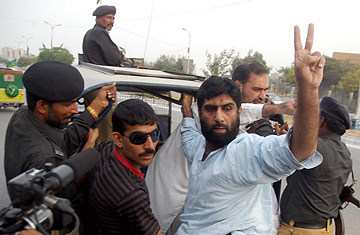
Police arrest supporters of opposition party Jamat-e-Islami in Karachi
(2 of 2)
Zardari supporters argue that the Sharifs, by summoning tens of thousands of protesters to Islamabad, were intent on toppling the new civilian government and forced its hand. Islamabad officials warned that riots could potentially bring down the government, tip the country into deeper chaos or even invite military intervention. In 1977, a movement led by right-wing and religious forces similar to the opposition parties aligned with Sharif brought down the first PPP government, then run by Zardari's father-in-law, and paved the way for Zia ul-Haq to seize power in a military coup.
But Aitzaz Ahsan, a leading attorney and member of the PPP who opposes Zardari's crackdown, counters that the lawyers are merely fighting for an independent judiciary that will fortify democracy in Pakistan. "We don't want military intervention; we want to strengthen parliament and the democratic system," he told TIME, also speaking by cell phone from an undisclosed location to evade arrest. "Existing examples of democratic government are testament to the fact that you can't have a stable parliament without an independent judiciary — it's a sine qua non. A democratic system will remain weak if there are timorous judges."
Ahsan added that "it's a tragic irony" that he is now being hunted by policemen on the orders of a government led by his own party. "It's also a joke," he said sourly. "Particularly because I stand the ground on which the late Benazir Bhutto [Zardari's assassinated wife] stood when she promised the reinstatement of the Chief Justice. And I stand on the ground that is sanctified by three signatures on three different occasions by the new President, Asif Ali Zardari. It's ironic that the person who didn't break an agreement should be on the run." (See pictures of Pakistanis mourning for Bhutto.)
Zardari's popularity has fallen steadily since he reneged on reinstating Chaudhry. Pakistan's vocal media has taunted him with video footage of his slain wife vowing to restore the independent-minded judiciary. Zardari allies argue that Chaudhry has become "too politicized"; they also worry that the former Chief Justice could paralyze the government with judicial activism if restored to office. Critics charge that the President only wants pliant judges who won't threaten to revive corruption charges against him.
Analysts believe the crackdown will make Zardari even more unpopular, while boosting the standing of Sharif, a man once loathed for his own earlier attacks on the judiciary. "It's a very ominous turn of events," said Farzana Shaikh, a Pakistan expert at London's Royal Institute of International Affairs. "These are not actions that one normally associates with an elected government that has flaunted its democratic credentials." While she rules out a coup, Shaikh believes that Zardari's latest maneuvering will "create great consternation in the senior ranks of the army." General Ashfaq Kayani made a surprise visit to Prime Minister Yousuf Raza Gilani on Wednesday to discuss the turmoil. "I suspect what might happen is an attempt by the military to orchestrate events in a way to curb or control Mr. Zardari's powers," added Shaikh. "Patience appears to be running out with Mr. Zardari — in Pakistan, among the military establishment and the international community."
See a story about Aitzaz Ahsan, leader of the lawyer's protests in Pakistan.
